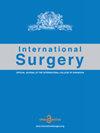右美托咪定对老年全髋关节置换术后谵妄的影响
IF 0.2
4区 医学
Q4 SURGERY
引用次数: 1
摘要
探讨右美托咪定对老年全髋关节置换术患者术后谵妄的影响。选择年龄60 ~ 85岁的美国麻醉师学会I级或II级全髋关节置换术患者100例,男42例,女58例,随机分为2组:右美托咪定组(D组;n = 50)和对照组(C组;N = 50)。D组患者自麻醉诱导前5分钟至手术结束,静脉滴注右美托咪定0.3 μg·kg−1·h−1。C组患者给予等量生理盐水。分别记录麻醉诱导前(T0)、拔管前1分钟(T1)和拔管后30分钟(T2)的心率和平均动脉压(MAP)。记录术后1、2、3 d的视觉模拟评分(VAS)、术后谵妄发生率、持续时间及住院时间。不良反应,如恶心、呕吐、嗜睡也有记录。两组患者的视觉模拟评分相近。D组患者T0与T1之间心率(P = 0.232)、MAP (P = 0.056)差异无统计学意义。与T0相比,C组T1时心率显著升高15.3 bpm (P = 0.000), MAP显著升高10.7 mmHg (P = 0.001)。D组术后谵妄发生率(10%)显著低于C组(26%;P = 0.037)。D组谵妄持续时间(1.3±0.6 D)短于C组(3.0±0.5 D);P = 0.000)。D组患者住院时间(13.2±0.9 D)短于C组(16.1±0.7 D);P = 0.000)。两组间不良反应无显著差异。静脉输注右美托咪定不仅可以减少老年全髋关节置换术患者术后谵妄的发生率和持续时间,而且可以缩短住院时间。本文章由计算机程序翻译,如有差异,请以英文原文为准。
Effects of Intraoperative Dexmedetomidine Infusion on Postoperative Delirium in Elderly Patients Undergoing Total Hip Arthroplasty
To investigate the effects of dexmedetomidine on postoperative delirium in elderly patients undergoing total hip arthroplasty.
A total of 100 patients, 42 male and 58 female, ages 60 to 85 years, American Society of Anesthesiologists grade I or II, who were undergoing total hip arthroplasty were randomly divided into 2 groups: a dexmedetomidine group (group D; n = 50) and a control group (group C; n = 50). Group D patients were infused with 0.3 μg · kg−1 · h−1 of dexmedetomidine from 5 minutes prior to anesthesia induction until the end of surgery. Group C patients received an equal volume of saline. Heart rate and mean arterial pressure (MAP) were recorded before anesthesia induction (T0), 1 minute before extubation (T1), and 30 minutes after extubation (T2). The Visual Analog Score (VAS) at 1, 2, and 3 days after surgery, the incidence and duration of postoperative delirium, and the length of hospital stay were recorded. Adverse reactions, such as nausea, vomiting, and lethargy, were also recorded.
The Visual Analog Scores in the 2 groups were similar. In group D, there was no significant difference in heart rate (P = 0.232) and MAP (P = 0.056) between T0 and T1. However, in group C, heart rate significantly increased by 15.3 bpm (P = 0.000) and MAP significantly increased by 10.7 mmHg (P = 0.001) at T1 compared with those at T0. The incidence of postoperative delirium in group D (10%) was significantly lower than that in group C (26%; P = 0.037). The duration of delirium in group D (1.3 ± 0.6 days) was shorter than that in group C (3.0 ± 0.5 days; P = 0.000). The length of hospital stay in group D (13.2 ± 0.9 days) was shorter than that in group C (16.1 ± 0.7 days; P = 0.000). No significant differences were observed in adverse effects between the 2 groups.
Intravenous infusion of dexmedetomidine can not only reduce the incidence and duration of postoperative delirium, but also shorten the length of hospital stay in elderly patients undergoing total hip arthroplasty.
求助全文
通过发布文献求助,成功后即可免费获取论文全文。
去求助
来源期刊

International surgery
医学-外科
CiteScore
0.30
自引率
0.00%
发文量
10
审稿时长
6-12 weeks
期刊介绍:
International Surgery is the Official Journal of the International College of Surgeons. International Surgery has been published since 1938 and has an important position in the global scientific and medical publishing field.
The Journal publishes only open access manuscripts. Advantages and benefits of open access publishing in International Surgery include:
-worldwide internet transmission
-prompt peer reviews
-timely publishing following peer review approved manuscripts
-even more timely worldwide transmissions of unedited peer review approved manuscripts (“online first”) prior to having copy edited manuscripts formally published.
Non-approved peer reviewed manuscript authors have the opportunity to update and improve manuscripts prior to again submitting for peer review.
 求助内容:
求助内容: 应助结果提醒方式:
应助结果提醒方式:


